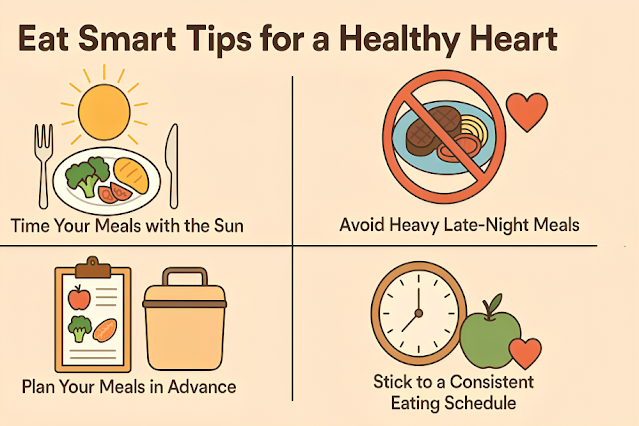Meal timing and heart health
Why When You Eat May Be More Important Than How Much You Sleep — Especially for Heart Health
In our fast-paced world today, we’re going to great lengths to monitor what we eat and how much we sleep — but new scientific research suddenly started talking about something that has largely been overlooked: when we eat. In fact, your meal timing might be more important for your heart health than your sleep habits, especially if you work irregular hours or night shifts.
Here’s a closer look at the science behind this and why adjusting your eating schedule could make for one of the simplest lifestyle adjustments you make in the interest of a healthier heart.
Why the Clock Works — You’re Not What You Eat, You Are What you Replace
Your body doesn’t just act helter-skelter. It operates on a circadian rhythm, an internal 24-hour clock that regulates everything from sleep to hormone release, metabolism, even digestion. This rhythm is in tune with natural cycles of light and dark, enabling the body to carry out particular tasks at some of the best possible times.
Your digestion and metabolism function best when you eat during the day — when, naturally, your body is more active. But eating late at night or in the early hours, especially if you are awake at those times because of shift work, can disrupt your internal systems.
Why late-night dinners are bad for your heart?
A new study from Brigham and Women’s Hospital found that meal timing is in fact more important for cardiovascular health than was previously appreciated. Individuals,who eat at night (especially shift workers) may have the risk of heart-related problems.
The research points to the following key findings:
💁 Later in the day, or during night shifts, higher blood sugar levels when meals are eaten.
💁 Raised blood pressure, and inflammatory markers, which indicate early-stage heart disease.
💁 Higher risk of stroke and heart attack in people who regularly eat outside the body’s ideal metabolic window.
So even if you’re sleeping enough, eating at the wrong times can still put undue stress on your heart.
Shift Workers: At Higher Risk But Not Hopeless
Night shift workers, in particular, are at a higher risk. They tend to experience chronic sleep disruption and have fewer choices regarding meal timing. But that doesn’t mean they’re doomed to heart trouble.
The good news? When you eat — even without changing what you eat — can cut your heart disease risk dramatically.
And studies have shown that night shift workers can improve their cardiovascular markers if they restrict food intake to daytime hours, even while working during one of the night shifts. That means eating in time with your body’s natural 24-hour rhythms can safeguard your heart — even if your work schedule doesn’t.
The Power of Daylight Eating
The body is more metabolically efficient in daytime. Here’s why eating during the day is heart-smart:
❤️ Better insulin sensitivity: Your body processes glucose more efficiently in the earlier part of the day, lowering your risk of developing type 2 diabetes — a major risk factor for heart disease.
❤️🔥 Reduce fat storage: Late-night eating will make you store more fat since there is less calorie-burning efficiency.
🫁 Improved digestion: Gastrointestinal processes slow down in the evening, making digestion more difficult at night.
Eating in the early part of the day just provides your body with the metabolic support it needs to work best.
Eat Smart Tips for a Healthy Heart
Even small changes to when you eat can have big benefits. Here’s how to get started:
1.Time Your Meals with the Sun
And try to consume most of your daily calories between 7am and 7pm — this range reflects a period close to your body's natural metabolism.
2.Avoid Heavy Late-Night Meals
And if you’re having a hunger attack late at night, consider a light snack that consists mostly of protein instead of carbs or sugar.
3.Plan Your Meals in Advance
If you’re a shift worker, prepare your meals in advance and take them with you. Try to consume them in periods that fall within the day-light window if you can.
4.Stick to a Consistent Eating Schedule
Eat at approximately the same time every day. This helps your body fall into a rhythm, which is good for digestion, sleep and general health.
Can We Say Sleep Isn’t Important? Not Quite.
Sleep remains absolutely one of the most important pillars of health. Sound sleep, or lack thereof, is associated with a range of afflictions including obesity, high blood pressure and mental health issues.
But this new study suggests that when you eat may have a more immediate impact on your heart than how long you sleep — especially when sleep patterns are interrupted by erratic work hours.
So ideally, good meal timing, plus good sleep, would want to start moving you in the right direction.
Takeaway: Don’t just reinvent your calories; rethink your clock
But when it comes to keeping a healthy heart, it’s no longer just about opting for kale instead of chips, or making it to the gym more regularly. Meal timing is having a moment in wellness—and for good reason.
Pairing your eating patterns to your body’s natural circadian rhythm may be one of the most potent, low-effort tools in your health toolbox. If you’re a night shift worker or just someone who wants to enhance your heart health, it’s time to eat with the clock in mind, not just the plate.
Have a nice Day 😊.









Comments
Post a Comment